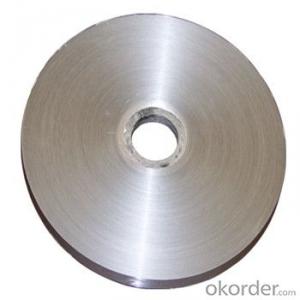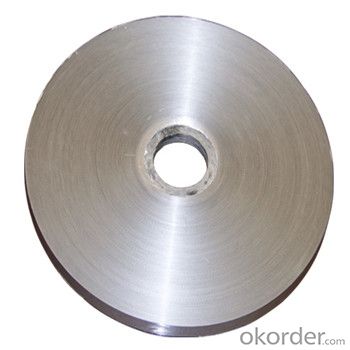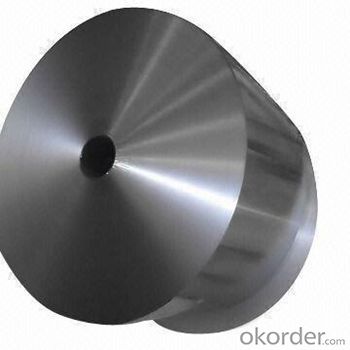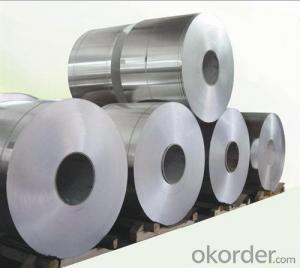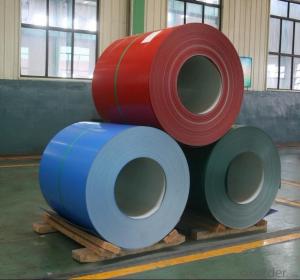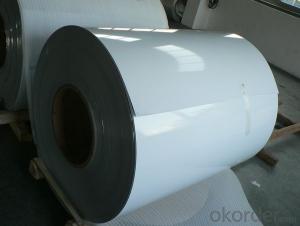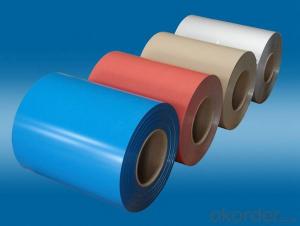Painting Aluminum Coil Stock for Cable & Wire Production
- Loading Port:
- China main port
- Payment Terms:
- TT OR LC
- Min Order Qty:
- 3 m.t
- Supply Capability:
- 10000 m.t/month
OKorder Service Pledge
OKorder Financial Service
You Might Also Like
Specification
1. Description of Plain Aluminium Foil for Cable & Wire Production
Aluminium foil polyester film lamianted (ALU PET) from aluminum foil provides waterproof and thermal insulation. Polyetser film acts as protection aluminum foil and high strength tensile.
| Constructure | Total Thickness | Weight | Yield |
| (g/m2) | (m2/kg) | ||
| AL7 PET12 | 22 mic | 39 | 25.6 |
| AL9 PET12 | 24 mic | 44 | 22.7 |
| A10 PET12 | 25 mic | 47 | 21.3 |
| AL7 PET12 AL7 | 32 mic | 63 | 15.9 |
| AL9 PET12 AL9 | 36 mic | 74 | 13.5 |
| AL10 PET12 AL10 | 38 mic | 79 | 12.7 |
| AL7 PET12 HDPE15 MPET12 | 67 mic | 104 | 9.6 |
| AL9 PET12 HDPE15 MPET12 | 69 mic | 106 | 9.4 |
| MPET12 HDPE15 MPET12 | 48 mic | 65 | 15.4 |
2. Advantages of Plain Aluminium Foil for Cable & Wire Production
1.High strength of polyester film, waterproof thermal insualtion of aluminum foil
2.New and good quality basic materials
3.RoHS and SGS standard
Aluminium foil material ALU / PET tape is used for Ventilation Industry for flexible duct pipe production,Electronic, HVAC system, Estate Construction and so on.
3. Feature of Plain Aluminium Foil for Cable & Wire Production
*Such coil is specially designed to replace aluminum ingot, due to the high export tax of aluminum ingot, the coil has better price than ingot.
*This type of coil can fit customer's remelting furnace just like ingot, no need to make any change to the production line that was previously used for ingot. The standard coil size and weight is very suitable for the feed gate of furnace.
*This type of coil causes less material wastage than ingot when remelted.
*Our coil is made directly from ore, no need to go though the ingot making process, quality is much better than other suppliers who use ingot scrap to make coil.
Be free from Oil Stain, Dent, Inclusion, Scratches, Stain, Oxide Dicoloration, Breaks, Corrosion, Roll Marks, Dirt Streaks and other defect which will interfere with use
4. Certificate:
SGS and ROHS(if client request, paid by client), MTC(plant provided), Certificate of Origin(FORM A, FORM E, CO), Bureau Veritas and SGS (if client request, paid by client), CIQS certificate
5. Image of Plain Aluminium Foil for Cable & Wire Production
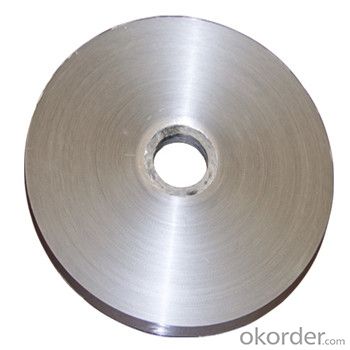
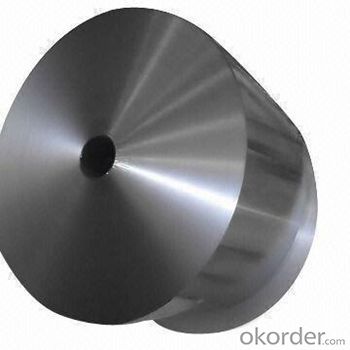
6. Package and shipping of Plain Aluminium Foil for Cable & Wire Production
eye to sky
eye to wall
with wooden pallet (wooden case also available)
7. FAQ
1) What is the delivery time?
Dpends on actual order, around 20 days
2) What is the QC system:
We have QC staff of 20 persons and advanced equipment, each production is with MTC traced from Aluminum ingot lot.
3) What market do you mainly sell to?
Australia, America, Asia, Middle East, Western Europe, Africa etc
- Q: Can aluminum coils be customized in terms of thickness?
- Yes, aluminum coils can be customized in terms of thickness. The thickness of aluminum coils can be modified through various manufacturing processes to meet specific requirements and applications.
- Q: How do aluminum coils compare to nickel coils in terms of conductivity?
- Aluminum coils generally have lower electrical conductivity compared to nickel coils. This is primarily because aluminum has a higher resistivity than nickel. In terms of conductivity, nickel is a superior conductor of electricity due to its lower resistivity. Therefore, nickel coils are often preferred in applications where high conductivity is crucial, such as in electrical circuits or heating elements. However, it is important to note that aluminum coils still possess reasonable conductivity and may be suitable for certain applications where cost-effectiveness or lightweight properties are more important factors to consider.
- Q: What is an aluminum coil?
- An aluminum coil is a long, flat, and thin piece of aluminum that is typically wound into a spiral shape. It is commonly used in various industries, such as construction, automotive, and electrical, due to its excellent corrosion resistance, lightweight nature, and high conductivity. Aluminum coils are often used for manufacturing products like gutters, roofing materials, heat exchangers, and electrical components.
- Q: Can aluminum coils be used in agricultural applications?
- Yes, aluminum coils can be used in agricultural applications. Aluminum is a versatile and lightweight material that offers several benefits for agricultural purposes. Aluminum coils are commonly used in various agricultural equipment and structures, such as greenhouse frames, irrigation systems, and grain storage bins. One of the main advantages of using aluminum coils in agricultural applications is their resistance to corrosion. Aluminum is naturally resistant to rust and can withstand exposure to moisture, chemicals, and other elements commonly found in agricultural environments. This makes it a durable and long-lasting choice for agricultural equipment that needs to withstand harsh conditions. Additionally, aluminum coils have excellent thermal conductivity, meaning they can efficiently transfer heat. This property makes aluminum coils suitable for applications such as heat exchangers, which are often used in agricultural machinery like tractors and combine harvesters. Efficient heat transfer helps in maintaining optimal operating temperatures and improving overall equipment performance. Moreover, aluminum coils are lightweight, which makes them easy to handle and transport. This is particularly advantageous in agricultural applications where equipment needs to be moved frequently, such as portable irrigation systems or lightweight structures. The lightweight nature of aluminum also helps reduce fuel consumption in machinery, leading to cost savings and environmental benefits. Furthermore, aluminum is a non-toxic material, making it safe to use in agricultural applications. It does not release any harmful chemicals or leach into the soil, ensuring that crops remain uncontaminated and safe for consumption. In summary, aluminum coils can indeed be used in agricultural applications due to their corrosion resistance, thermal conductivity, lightweight nature, and non-toxic properties. These qualities make aluminum a reliable and efficient choice for various agricultural equipment and structures, contributing to increased productivity and sustainability in the agricultural industry.
- Q: How are aluminum coils used in the production of power transmission lines?
- Due to their unique properties and benefits, aluminum coils are extensively used in the production of power transmission lines. These coils, typically made from high-quality aluminum alloys, offer excellent conductivity, strength, and corrosion resistance. A key application of aluminum coils in power transmission lines is their use in manufacturing overhead conductors. These conductors transmit electrical energy from power plants to substations and distribution networks. Aluminum coils are used to create the conductive core of these overhead conductors because aluminum has lower resistance compared to metals like copper. This low resistance allows for efficient electricity transmission over long distances, minimizing energy loss and improving system performance. In addition, aluminum coils are lighter than copper coils, making them easier to handle and install. This characteristic significantly reduces transportation, installation, and maintenance costs of power transmission lines. Consequently, aluminum coils have become the preferred choice for overhead conductors in power transmission systems worldwide. Moreover, the corrosion resistance of aluminum coils ensures the long-term durability and reliability of power transmission lines. Aluminum naturally develops a protective oxide layer that prevents further corrosion, even in harsh environmental conditions. This corrosion resistance extends the lifespan of transmission lines, reducing the need for frequent repairs or replacements. In conclusion, aluminum coils play a vital role in the production of power transmission lines. They enable efficient electricity transmission, reduce costs, and provide long-lasting corrosion resistance. With these advantages, aluminum coils have become widely adopted in the power industry to enhance the performance and reliability of power transmission systems.
- Q: How do aluminum coils contribute to the corrosion resistance of marine applications?
- Aluminum coils play a crucial role in enhancing the corrosion resistance of marine applications. This is primarily due to the unique properties and characteristics of aluminum as a material. Firstly, aluminum has a natural oxide layer that forms on its surface when exposed to air, which is highly resistant to corrosion. This oxide layer acts as a protective barrier that prevents further oxidation and corrosion of the metal. This inherent property of aluminum makes it an ideal choice for marine applications, where constant exposure to saltwater and moisture can be highly corrosive. Furthermore, aluminum coils can be alloyed with other elements such as magnesium and manganese to further enhance their corrosion resistance. These alloying elements not only strengthen the aluminum but also improve its resistance to pitting and crevice corrosion. Pitting corrosion occurs when localized damage to the oxide layer exposes the underlying metal, while crevice corrosion occurs in areas where oxygen is restricted, such as gaps or joints. By alloying aluminum, the coils become more resistant to these types of corrosion, making them highly suitable for marine environments. Moreover, aluminum coils can be coated with protective finishes such as anodizing or painting, which provide an additional layer of protection against corrosion. Anodizing involves creating a thicker and more durable oxide layer on the aluminum surface, thereby increasing its resistance to corrosion. Painting, on the other hand, acts as a physical barrier that shields the coils from direct contact with corrosive elements present in the marine environment. In conclusion, aluminum coils contribute to the corrosion resistance of marine applications through their natural oxide layer, alloying with other elements, and the option of protective finishes. These characteristics make aluminum coils highly durable and capable of withstanding the harsh conditions encountered in marine environments, ensuring their longevity and reliability.
- Q: aluminium plate - 1800mm x 950mm x 1.5mmprocesses - i) sandblasting ii) polyethylene coating iii) matt blastingWhy does aluminium plate warp after the first process?How to prevent warping? Other than increasing material thickness (weight issue)
- Sandblasting Aluminium
- Q: Can aluminum coils be used in electrical or electronic applications?
- Yes, aluminum coils can be used in electrical or electronic applications. Aluminum is a highly conductive material and has several advantages over other materials, such as copper, when it comes to coil applications. Aluminum coils are lightweight, which makes them suitable for applications where weight is a concern. They also have good thermal conductivity, allowing for efficient heat dissipation. Additionally, aluminum coils are corrosion-resistant, making them durable and suitable for outdoor or high-humidity environments. However, it is important to note that aluminum has a lower electrical conductivity compared to copper, so the design and dimensions of the coil need to be carefully considered to ensure optimal performance.
- Q: Can aluminum coils be used in high-temperature applications?
- No, aluminum coils are not suitable for high-temperature applications as they have a low melting point and tend to lose their structural integrity at elevated temperatures.
- Q: Can aluminum coils be used in the production of aluminum foil?
- Indeed, the utilization of aluminum coils is viable in the manufacturing of aluminum foil. Normally, aluminum coils are generated through the process of rolling aluminum ingots between substantial rollers, resulting in the formation of slender and level sheets. Subsequently, these coils can be subjected to additional procedures to yield aluminum foil. The coils are unwound and conveyed through a sequence of rolling mills that gradually diminish the thickness of the metal until the desired gauge for aluminum foil is attained. Following this, the foil is sliced into sheets or wound into rolls for the purpose of packaging and distribution. Aluminum coils offer a cost-efficient and effective means to generate substantial quantities of aluminum foil.
Send your message to us
Painting Aluminum Coil Stock for Cable & Wire Production
- Loading Port:
- China main port
- Payment Terms:
- TT OR LC
- Min Order Qty:
- 3 m.t
- Supply Capability:
- 10000 m.t/month
OKorder Service Pledge
OKorder Financial Service
Similar products
Hot products
Hot Searches
Related keywords
